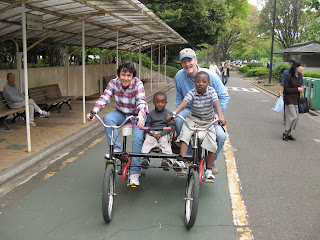What’s happened to my brain? With so many Christmas-related activities, family coming home for the holidays, and our traveling back to Kobe from Tokyo to lead the church in celebrating Christmas and New Years, my head seems to have shifted into neutral. As a result, it’s been two and a half weeks since I’ve written for our blog. I’d like to change that today while everyone is out shopping. Besides, shopping isn’t a favorite pastime of mine, even if my head and body weren’t tired from the pace of December.
Let me say up front: I’m not a kanji expert. In truth, I use these thousands of Chinese characters as little as possible, which explains why my Japanese reading and writing level is actually quite embarrassing for someone who has lived nearly thirty years in Japan. Still, I know a few characters. One of the most interesting is the kanji for busy—in Japanese, isogashii. It is made up of two parts. The right half is the character for “to lose.” The left half represents “heart.” In other words, when one becomes busy, one risks the danger of losing one’s heart.
In fact, this is exactly what has happened to me this month. Certainly it’s nothing I’m proud about. After all, as a Christian, Christmas ought to be one of the most meaningful times of the year. Writing Christmas cards should be a joyful exercise in sharing the good news of Jesus’ birth as the angels did when they appeared to the shepherds on the hillsides outside of Bethlehem. Instead they gave me stiff shoulders. I felt more pressure than pleasure as I wrote and wrote and wrote, and I’m still not finished although Christmas Day 2007 is now history. (And from yesterday, the Japanese custom of writing New Year’s cards was added to my never-ending “to do” list.)
Then there’s the busy church calendar of special activities, including the Christmas Eve candle service, a children’s Christmas party, and a New Year’s Day service not yet planned, much less prepared. Even if I only attended these, they would still take time. On top of this, our family of two suddenly has expanded to six, so there are many added household chores, never-ending trips to the grocery store, and dinner preparations that begin almost as soon as the last meal’s dishes have been washed, dried, and put away. I’m thankful everyone is helping eagerly, and I’m overjoyed our family is together once again—usually we’re in three different countries—but I sometimes find myself sighing loudly with physical and emotional tiredness. Isogashii seems to have taken its toll.
I am reminded that Jesus left his disciples at the end of a busy day to go up into the mountains to pray. He’d just had a major teaching assignment for a huge crowd that had gathered on the hillside. Afterwards everyone was hungry, so he miraculously fed five loaves and two fish to five thousand men, not counting the women and children. (And I thought I had a houseful to feed!) Day after day, and not just in December, the demands on Jesus were endless. The only way to keep from losing his heart in the midst of it all was to protect his quiet time with the Father whereby he could be refreshed and renewed.
In fact, this is exactly what I did this morning. Is it any wonder I’m feeling my heart again?
Let me say up front: I’m not a kanji expert. In truth, I use these thousands of Chinese characters as little as possible, which explains why my Japanese reading and writing level is actually quite embarrassing for someone who has lived nearly thirty years in Japan. Still, I know a few characters. One of the most interesting is the kanji for busy—in Japanese, isogashii. It is made up of two parts. The right half is the character for “to lose.” The left half represents “heart.” In other words, when one becomes busy, one risks the danger of losing one’s heart.
In fact, this is exactly what has happened to me this month. Certainly it’s nothing I’m proud about. After all, as a Christian, Christmas ought to be one of the most meaningful times of the year. Writing Christmas cards should be a joyful exercise in sharing the good news of Jesus’ birth as the angels did when they appeared to the shepherds on the hillsides outside of Bethlehem. Instead they gave me stiff shoulders. I felt more pressure than pleasure as I wrote and wrote and wrote, and I’m still not finished although Christmas Day 2007 is now history. (And from yesterday, the Japanese custom of writing New Year’s cards was added to my never-ending “to do” list.)
Then there’s the busy church calendar of special activities, including the Christmas Eve candle service, a children’s Christmas party, and a New Year’s Day service not yet planned, much less prepared. Even if I only attended these, they would still take time. On top of this, our family of two suddenly has expanded to six, so there are many added household chores, never-ending trips to the grocery store, and dinner preparations that begin almost as soon as the last meal’s dishes have been washed, dried, and put away. I’m thankful everyone is helping eagerly, and I’m overjoyed our family is together once again—usually we’re in three different countries—but I sometimes find myself sighing loudly with physical and emotional tiredness. Isogashii seems to have taken its toll.
I am reminded that Jesus left his disciples at the end of a busy day to go up into the mountains to pray. He’d just had a major teaching assignment for a huge crowd that had gathered on the hillside. Afterwards everyone was hungry, so he miraculously fed five loaves and two fish to five thousand men, not counting the women and children. (And I thought I had a houseful to feed!) Day after day, and not just in December, the demands on Jesus were endless. The only way to keep from losing his heart in the midst of it all was to protect his quiet time with the Father whereby he could be refreshed and renewed.
In fact, this is exactly what I did this morning. Is it any wonder I’m feeling my heart again?
























